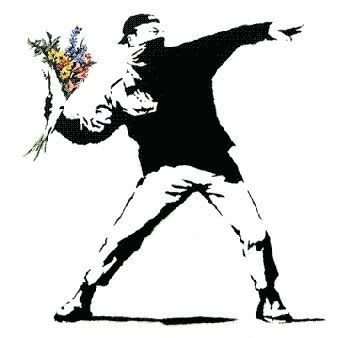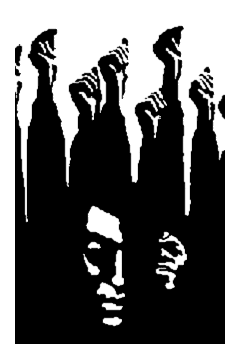Jenni Rivera y los 9 Puntos del Feminismo Chingona
Por Raúl Alcaraz Ochoa | http://www.antifronteras.com
Existe un feminismo de barrio con identidad Chicana-Mexicana que ha surgido de las sombras con mayor fervor con la carrera artística de la cantautora Jenni Rivera. Jenni es heredera de un legado de artistas con rabia femenina basadas en México o los EE.UU. que han logrado interrumpir el narrativo machista del corrido, Tejano, mariachi, banda, norteño, al igual que el arte y el cine, tal como Selena, Lydia Mendoza, Amparo Ochoa, Chavela Vargas, Linda Rondstadt, Paquita la del Barrio, Chayito Valdez, Frida Kahlo, y María Félix, entre otras.
El Feminismo Chingona nace dentro del contexto del machismo en el hogar y comunidad Latino-americana—donde la prioridad y el poder son concedidos por su mayoría a lo masculino. Es un machismo con tendencias fuertes, agresivas y violentas, que se siente superior a lo femenino, intenta no demostrar emociones vulnerables, y se basa en dominar e imponerse por medio del puño duro y “los huevos hinchados” del hombre más chungón—ósea, la autoridad masculina. Jenni Rivera vivió el machismo de su padre y hermanos, al igual que de parejas abusivas donde ella fue sobrevienta de la violencia doméstica y fue afectada por el asalto sexual.
Igualmente, este Feminismo Chingona nace de la opresión de raza y clase económica. Existe la opresión racial hacia las comunidades Latino-americanas estadounidense, con y sin papeles. Hija de padres migrantes de clase pobre, Jenni fue criada en un hogar y comunidad migrante de clase obrera. Jenni estaba en el vientre cuando su madre y padre cruzaron la frontera para establecerse en los EE.UU. Esto le dio raíz a un feminismo que tumba fronteras y que viene de las intersecciones de las discriminaciones basadas en raza, género, y clase económica.
El Feminismo Chingona se declara fuerte, feroz, afirmativo y hasta agresivo. El feminismo Chingona no se deja, y deja de aguantar; te confronta, te cuestiona, te reta, te contradice y te agita con su orgullo y dignidad femenil humana, amenaza tu superioridad y tus privilegios, tu comodidad y valores machistas que por siglos han sido impuestos por la fuerza y transmitidos en nuestras familias desde la colonización Europea. Ella dice lo que piensa sin pelos en la lengua, te agrede si eres injusto porque su lengua es una bala que te deja con los huevos estrellados. Ella siempre aboga por su existencia femenil. Este feminismo es militante, subversivo; está en la defensiva y la ofensiva, dependiendo en la necesidad de la situación. Y no le da miedo de agredir en auto-defensa. Ella esta armada. Se considera guerrera sufrida pero luchona, y el mundo es su campo de batalla. Se acepta y se ama en todo su esplendor, sin discriminar por el peso o las libras de una. Se adueña de su cuerpo y hace y deshace como quiere y cuando quiere, sin el permiso de su familia o los estándares de la sociedad. Utiliza el tono y carácter del machismo y la ultra-masculinidad, y lo voltea, y lo convierte en un feminismo feroz de ultra-feminidad. Si la dudas y no crees en su capacidad o inteligencia o liderazgo, ella te dejara con la boca abierta porque te comprobara con hechos de tu equivocación. No está en contra del hombre, pero si le harta del machismo y el patriarcado, ósea detesta la desigualdad de género. Así que si no crees en la igualdad, ella es tu enemiga. Es feroz, en el sentido de que no es sumisa, ni agacha la cabeza ante nadie, ni aguanta, y si si aguanta, eso es algo temporal porque pronto, como un volcán, estallara y declara YA BASTA.
Ahora, a lo largo de los acontecimientos de su vida y letra de canciones escritas por Jenni, le da voz a un feminismo de barrio chingona. Los 9 Puntos del Feminismo Chingona de Jenni Rivera son los siguientes:
- SOY GUERRERA CHINGONA, Y TENGO LOS OVARIOS BIEN GRANDOTES. Se valorizan los ovarios, ósea la fuerza, poder, y dignidad femenil. “Fui una guerrillera fuerte/ que por sus hijos luchó / recuerden muy bien que en vida / su madre no se rajo / con la frente muy en alto / despídanla con honor…/ Ya se fue la hija del pueblo / la mujer de los huevotes.” (Canción: “Cuando Muere una Dama”) “Soy madre soltera / y mi vida entera daría por el / por ese pequeño velo por sus sueños / y sueño con el / soy madre soltera lucho como fiera / soy hombre y mujer / y ojalá que nunca me reproche / padre no tener.” (Canción: “Madre Soltera”) “Sigan poniéndome peros / sigan buscándome el clavo / búsquenle hasta que se encuentren / los ovarios que me cargo…. y grandotes. (Canción: “Ovarios”).
- SOY UNA DAMA DIVINA. Sin importar mi físico, sea grande o pequeña de cuerpo, yo valgo y soy belleza. Me tengo que amar a mí misma. “Yo no he ganado coronas ni concursos de belleza / sin tener joyas muy finas / soy una dama divina / No soy bombón suculento / ni presumo de buen cuerpo / si te echas unos tequilas / soy una dama divina.” (Canción: “Dama Divina”)
- SOY REBELDE, ATREVIDA, CHAKALOSA, Y MALANDRINA. Interrumpimos y subvertimos el narrativo machista. No aceptamos que nuestras parejas, familias, y la sociedad imponga poder y control sobre nuestras vidas. Nosotras definimos quienes somos y forjamos nuestro propio camino. “Nos dicen las malandrinas / porque hacemos mucho ruido… No somos como las popis / que se paran mucho el cuello / nos gusta la rancherada / de nada tenemos miedo / y le damos gusto al gusto / aunque otras no estén de acuerdo.” (Canción: “Las Malandrinas”) “No soy perfecta y tampoco soy de lo peor / más me defiendo como gata boca arriba / y échense un grito / las mujeres como yo.” (Canción: “Parrandera, Atrevida y Rebelde”)
- TENGO ORGULLO DE SER CHICANA/MEXICANA/LATINA. Ante tanto racismo y discriminación, es importante sentirnos seguras y muy conectadas a nuestras raíces culturales. Tengo mucho orgullo de ser Mexicana. “Yo soy Chicana, Californiana / y de Jalisco mis padres son / y mis costumbres son mexicanas.” (Canción: “Chicana Jalisciense”)
- CONDENO AL RACISMO. La justicia de nuestro pueblo es esencial. Tenemos dignidad humana y no podemos permitir ser discriminados como pueblo humilde, obrero, migrante, Latino. “[La SB 1070- ley anti-migrante] es una injusta, discriminatoria, es odio, no respeta a la humanidad y es racista … Lo que esta ley intenta hacer es no solo separar a familias, pero tiene propósito de discriminar y perseguirnos… ¡Tenemos que parar esto! ¡Viva la Raza! ¡Viva la Justicia!” (Discurso en Phoenix, Arizona en marcha contra la SB 1070, 2010)
- NO TOLERO LA VIOLENCIA DOMESTICA, NI EL ABUSO SEXUAL. “No es necesario tolerar [la violencia de genero], ni por amor, ni por desamor, ni por capricho, ni porque te falte dinero para pagar la renta, o porque te falte dinero para comprar los pampers….Empiezas a ser feliz cuando te amas ti misma. Aprender a amarte a ti misma más que a él es lo más bonito, porque ese amor es lo que te saca a ti y a tus hijos [de la violencia doméstica y el abuso sexual]. (Discurso en la conferencia de National Coalition Against Domestic Violence, 2010)
- MI RABIA FEMENINA ES JUSTIFICADA. La rabia femenina origina del machismo y los comportamientos machistas de los hombres. Y cuando sea agredida de ese machismo, igualmente en mi auto-defensa, serás agredido. “Imbécil / Te voy a dar tu boleto / de segunda y sin regreso / porque quiero que / te largues / Imbécil /eres el peor compañero / tan falso cual traicionero / será por falta de madre / Creciste / como perro callejero / pero de ellos aprendiste solamente / sus aullidos / porque ellos / jamás le muerden la mano / a quien les avienta un taco / y tú eres un mal nacido / por eso / mejor se murió tu madre / para no mirar los desgarres / y lo poco hombre que eres / que pena / que habiendo tantos caminos / vinieras a dar conmigo / pretendiendo mis quereres / Imbécil / tienes tan poca vergüenza / que igual que judas me besas / cada vez que te conviene / basura / pero te falta cerebro / y algo mucho más que eso / para ponerte / a mi altura.” (Canción: “Imbécil”)
- APOYO A LA COMUNIDAD LGBTQ (Lesbiana, Gay, Bisexual, Transgenero). Es importante apoyar a la comunidad lesbiana, gay, bisexual y transgenero porque también son lastimado/as y oprimidos/as. Tenemos que parar el hostigamiento hacia ellas y ellos. Necesitamos tener igualdad para todas y todos.
- ¡MUJERES UNAMONOS! Es importante tener solidaridad entre las mujeres y lo femenino. “No hay que pelearnos… Hay que apoyarnos mujeres / y dejar al que nos mienta / hay que dejarlo sufrir / que llore y se arrepienta / y que sepa valorarnos / que no nos crea sus sirvientas” (Canción: “Ajustando Cuentas”) porque ¡las mujeres unidas, jamás serán vencidas!
Claro, como cualquier otro ser humano o teoría política-social, existen las contradicciones. Jenni promovía mucho el alcohol, glorificaba el poder del narcotráfico con sus narco-corridos donde se auto-nombraba la “jefa de jefas”, fue empresaria y lucro mucho con ello y la industria de los medios de comunicación corporativa, y tenía una que otra canción donde no comunicaba mayor solidaridad con otras mujeres, como las canciones “Contrabando” o “Querida Socia”.
Para concluir, Jenni Rivera logro ser una de las pocas Chicanas en agarrar fama Latinoamericana, subvertir el machismo y la supremacía masculina, retar y deshacer la dicotomía de que una tiene que ser “virgen” o “puta”, rompió la expectativa de la mujer dócil, sumisa Mexicana, demostró poder y determinación sobre su cuerpo y sexualidad, y le dio voz a la pobreza, lucha de género, dolor, alegrías y retos políticos/sociales en los que vivió a lo largo de su vida en carne y hueso.
¡VIVA JENNI RIVERA! y ¡VIVA EL FEMENISMO CHINGONA!



